
In the midst of preparing for a Supreme Court battle that could have major ramifications for streaming video and the television industry as a whole, Aereo was dealt a major blow today in a Utah courtroom. In the first big win for broadcasters, who have filed a litany of suits against Aereo, U.S. District Justice Dale Kimball granted a preliminary injunction against the streaming service, shutting it down in six western regions.
Aereo has been in hot water with the four major networks and local broadcasters since its inception two years ago. Like rival service, FilmOn, Aereo rents tiny antennae to users for a monthly fee, which allows them to watch broadcasts of network content online and at their leisure. FilmOn has even taken things further recently, with an antenna-free connection to its broadcasts.
But unlike FilmOn, which has endured two courtroom losses, Aereo has thus far gone largely unscathed. The company has argued that its rebroadcasting of network content is a private performance, and therefore protected under the law. Decisions in both New York and Boston effectively upheld those claims, preventing injunctions in those cases.
Major networks like Fox and CBS have argued Aereo and FilmOn’s unlicensed services are public performances, and further, that they cause irreparable harm to their content, painting the services as a major threat to billions of dollars in annual revenue. The conglomerates that own the ‘big four’ have used their deep pockets to keep both streaming services in the courtroom virtually throughout their existence. The constant legal brawling has resulted in the Supreme Court agreeing to hear the case in a final, winner-takes-all throw-down slated for this April.
As reported by Variety, Justice Kimball called out Aereo’s entire business model in his 26 page decision, stating the company attempts to take advantage of a “perceived loophole” in a 1976 copyright law. Kimball made several arguments for the networks’ claims of irreparable harm to their content, and also stated that the law is clearly written to apply to “any performance made available to the public,” taking a major swipe at Aereo’s main claim to legality, founded on its use of privately leased antennae for each broadcast.
The injunction will effectively bar Aereo from setting up shop in Utah, Colorado, Montana, New Mexico, Oklahoma, and Wyoming, and will put a stop to its current services in the metropolitan areas of both Salt Lake City and Denver. While Kimball stayed the actual lawsuit until after the forthcoming Supreme Court case, he used his argument to issue the injunction until the Utah case resumes – assuming that will even be necessary after the High Court’s ruling.
Aereo has apologized publicly to its western customers, and vowed to fight on and restore service as soon as possible. It’s not clear if the win for broadcasters will have an effect on the Supreme Court case, but it certainly won’t help matters for Aereo, or FilmOn. Meanwhile, after a litany of lawsuits and years fighting it out in the courts, the big four finally have something to gloat about. We’ll see who’s smiling after the case makes its prime time debut this April.

